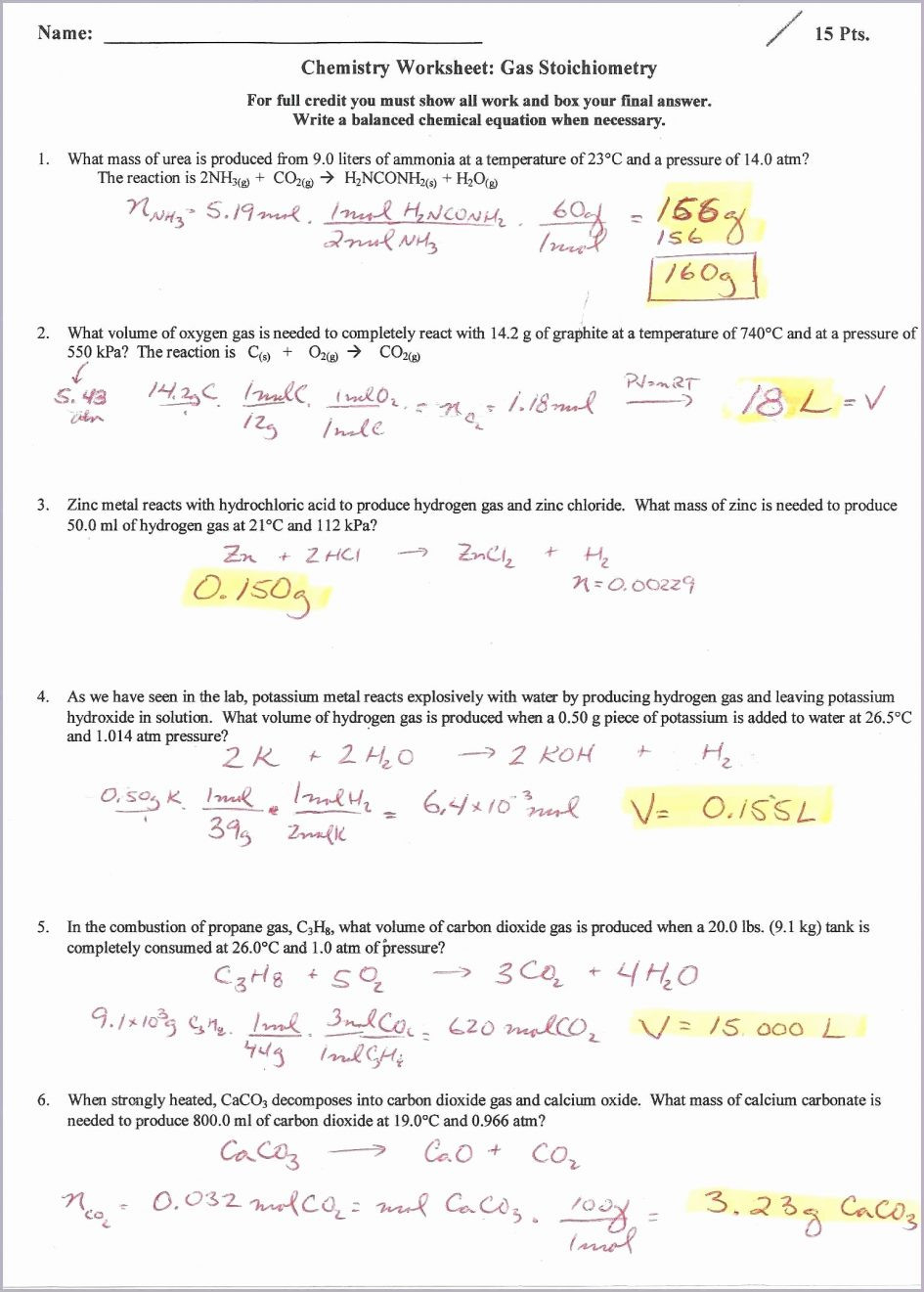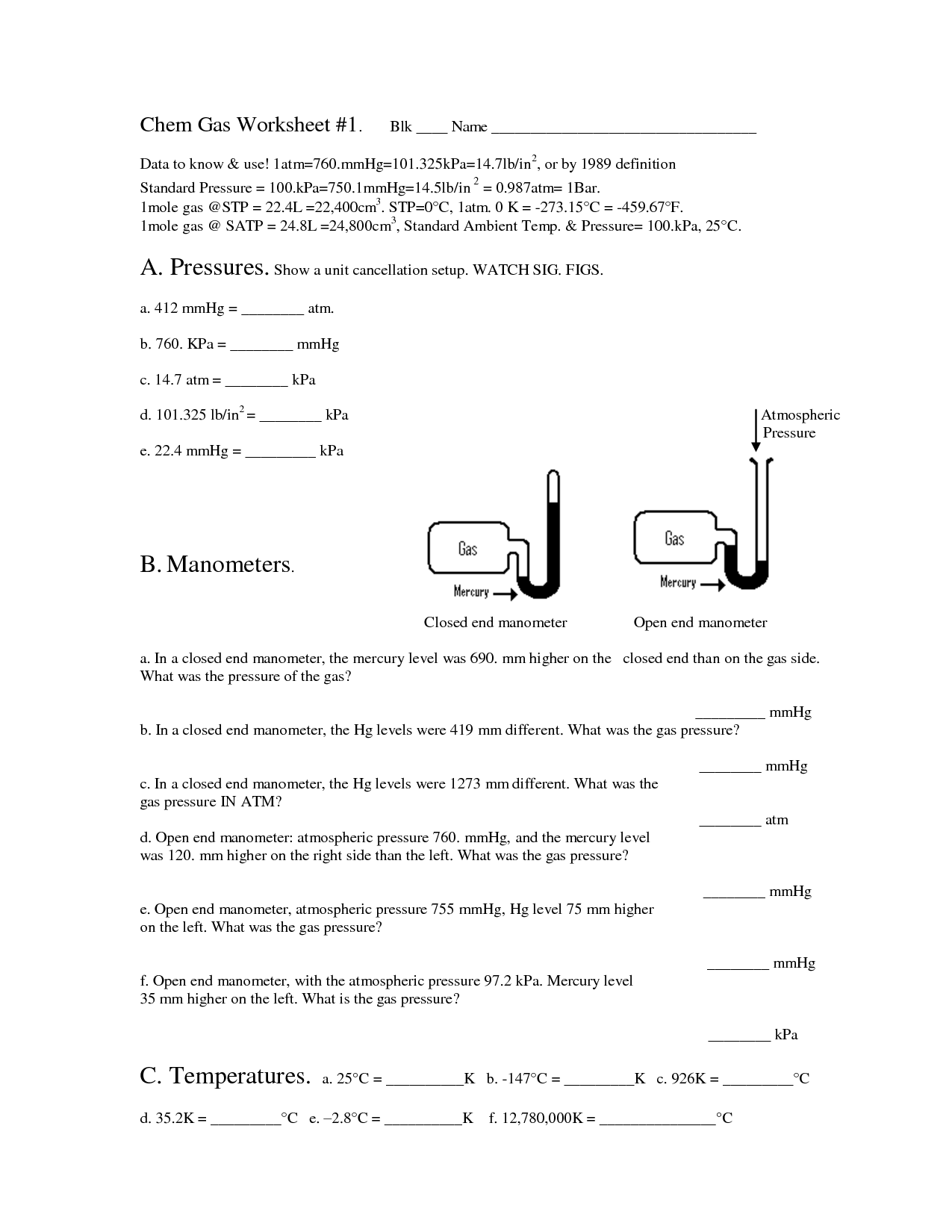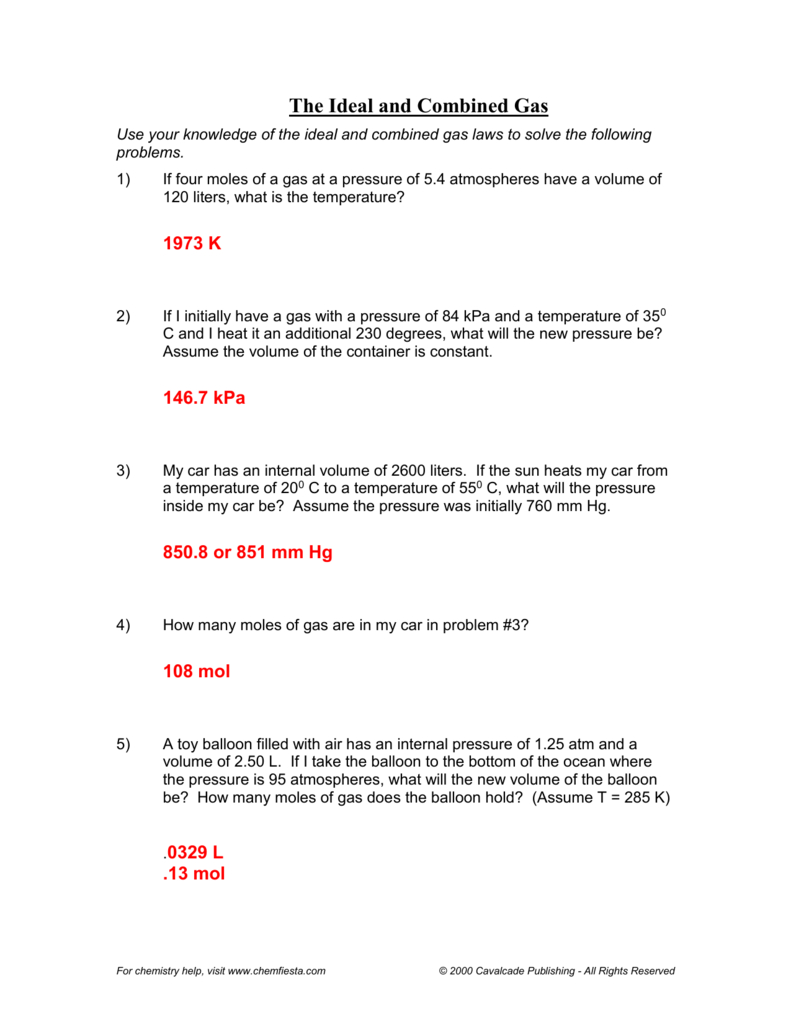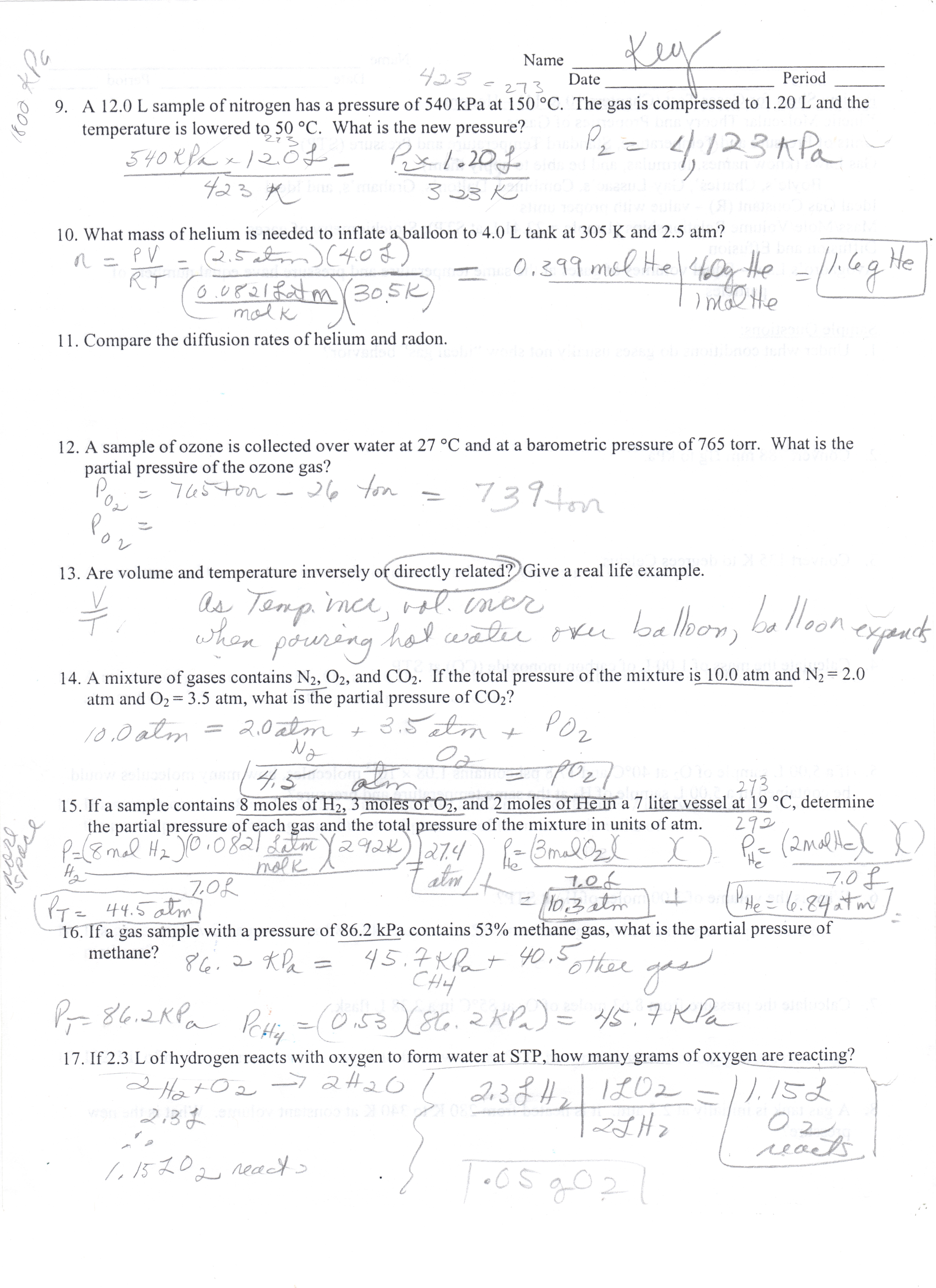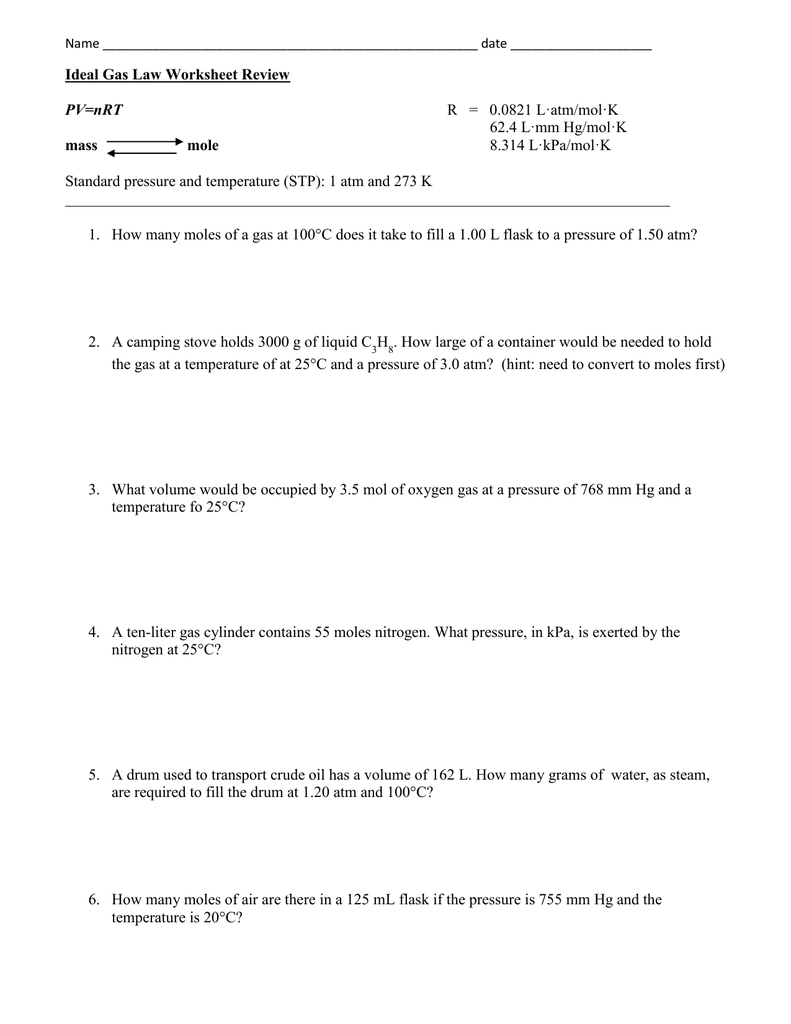Ideal Gas Law Worksheet Answers - The ideal and combined gas laws use your knowledge of the ideal and combined gas laws to solve the following problems. Assume that the lungs are at 1.00 atm. Show your work, including proper units, to earn full credit. The ideal gas law states that pv = nrt, where p is the pressure of a gas, v is the volume of the gas, n is the number of moles of gas present, r is the ideal. The gas laws worksheet focuses on several fundamental gas laws, such as boyle’s law, charles’s law, avogadro’s law, and the ideal gas. Solve each of the following problems. How many moles of gas (air) are in the lungs of an adult with a lung capacity of 3.9 l? The ideal gas law states that pv=nrt, where p is the pressure of a gas, v is the volume of the gas, n is the number of moles of gas present, r is the ideal gas. The ideal gas law directions:
The gas laws worksheet focuses on several fundamental gas laws, such as boyle’s law, charles’s law, avogadro’s law, and the ideal gas. Solve each of the following problems. The ideal gas law states that pv=nrt, where p is the pressure of a gas, v is the volume of the gas, n is the number of moles of gas present, r is the ideal gas. Assume that the lungs are at 1.00 atm. The ideal gas law directions: The ideal and combined gas laws use your knowledge of the ideal and combined gas laws to solve the following problems. The ideal gas law states that pv = nrt, where p is the pressure of a gas, v is the volume of the gas, n is the number of moles of gas present, r is the ideal. How many moles of gas (air) are in the lungs of an adult with a lung capacity of 3.9 l? Show your work, including proper units, to earn full credit.
The ideal and combined gas laws use your knowledge of the ideal and combined gas laws to solve the following problems. The gas laws worksheet focuses on several fundamental gas laws, such as boyle’s law, charles’s law, avogadro’s law, and the ideal gas. How many moles of gas (air) are in the lungs of an adult with a lung capacity of 3.9 l? The ideal gas law states that pv = nrt, where p is the pressure of a gas, v is the volume of the gas, n is the number of moles of gas present, r is the ideal. The ideal gas law states that pv=nrt, where p is the pressure of a gas, v is the volume of the gas, n is the number of moles of gas present, r is the ideal gas. Assume that the lungs are at 1.00 atm. Solve each of the following problems. The ideal gas law directions: Show your work, including proper units, to earn full credit.
Combined Gas Law And Ideal Gas Law Worksheet Combined Gas La
The ideal gas law states that pv=nrt, where p is the pressure of a gas, v is the volume of the gas, n is the number of moles of gas present, r is the ideal gas. Show your work, including proper units, to earn full credit. The ideal gas law states that pv = nrt, where p is the pressure.
Worksheet Combined Gas Law And Ideal Gas Law
Show your work, including proper units, to earn full credit. The gas laws worksheet focuses on several fundamental gas laws, such as boyle’s law, charles’s law, avogadro’s law, and the ideal gas. The ideal gas law states that pv=nrt, where p is the pressure of a gas, v is the volume of the gas, n is the number of moles.
Ideal Gas Law Worksheet Pv Nrt Answers
How many moles of gas (air) are in the lungs of an adult with a lung capacity of 3.9 l? The ideal gas law states that pv=nrt, where p is the pressure of a gas, v is the volume of the gas, n is the number of moles of gas present, r is the ideal gas. The gas laws worksheet.
Worksheet Gas Stoichiometry Worksheet Ideal Gas Law —
The ideal gas law states that pv = nrt, where p is the pressure of a gas, v is the volume of the gas, n is the number of moles of gas present, r is the ideal. How many moles of gas (air) are in the lungs of an adult with a lung capacity of 3.9 l? Show your work,.
Worksheet Combined Gas Law And Ideal Gas Law
The ideal gas law directions: How many moles of gas (air) are in the lungs of an adult with a lung capacity of 3.9 l? Solve each of the following problems. Assume that the lungs are at 1.00 atm. The ideal and combined gas laws use your knowledge of the ideal and combined gas laws to solve the following problems.
Solved Gases Worksheet 9 Rev 9 Exercise F. Ideal Gas Law
The ideal gas law states that pv=nrt, where p is the pressure of a gas, v is the volume of the gas, n is the number of moles of gas present, r is the ideal gas. The ideal and combined gas laws use your knowledge of the ideal and combined gas laws to solve the following problems. The gas laws.
Ideal Gas Law Worksheet Pv Nrt —
Solve each of the following problems. Assume that the lungs are at 1.00 atm. Show your work, including proper units, to earn full credit. The ideal gas law states that pv=nrt, where p is the pressure of a gas, v is the volume of the gas, n is the number of moles of gas present, r is the ideal gas..
Ideal Gas Law Chem Worksheet 144 Answer Key LINK
The ideal gas law states that pv = nrt, where p is the pressure of a gas, v is the volume of the gas, n is the number of moles of gas present, r is the ideal. Show your work, including proper units, to earn full credit. The ideal and combined gas laws use your knowledge of the ideal and.
Ideal Gas Law Worksheet With Answers Pdf
The ideal gas law states that pv = nrt, where p is the pressure of a gas, v is the volume of the gas, n is the number of moles of gas present, r is the ideal. The ideal gas law states that pv=nrt, where p is the pressure of a gas, v is the volume of the gas, n.
The Ideal Gas Law States That Pv=Nrt, Where P Is The Pressure Of A Gas, V Is The Volume Of The Gas, N Is The Number Of Moles Of Gas Present, R Is The Ideal Gas.
The ideal gas law directions: The gas laws worksheet focuses on several fundamental gas laws, such as boyle’s law, charles’s law, avogadro’s law, and the ideal gas. Show your work, including proper units, to earn full credit. Assume that the lungs are at 1.00 atm.
Solve Each Of The Following Problems.
The ideal gas law states that pv = nrt, where p is the pressure of a gas, v is the volume of the gas, n is the number of moles of gas present, r is the ideal. The ideal and combined gas laws use your knowledge of the ideal and combined gas laws to solve the following problems. How many moles of gas (air) are in the lungs of an adult with a lung capacity of 3.9 l?



